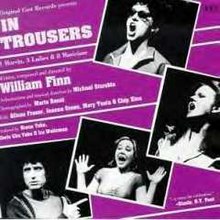|
In Trousers
In Trousers is a one-act musical that premiered Off-Broadway in 1979 with book, music and lyrics by William Finn. It is the first in a trilogy of musicals, followed by March of the Falsettos and then Falsettoland. ConceptThe one-act musical, In Trousers, centers around a Character named Marvin. In this production he recalls his school years and the events that shaped him. He reminisces the past relationships he shared with, among others, his high school sweetheart and Miss Goldberg (his English teacher who let him play Christopher Columbus in the school play). A pivotal point to the plot, however, is his realization of his homosexuality. Torn between his natural inclination and his desire not to upset his family life as he knows it, Marvin begins a struggle of identity that continues to be a theme in the trilogy. ProductionsIn Trousers, directed by Finn, was developed off-off-Broadway in 1978[1] and mounted twice in 1979 at Off-Broadway's Playwrights Horizons, opening on February 21 for 24 performances and again on December 8 for 8. The cast -- Chip Zien, Alison Fraser, Joanna Green, and Mary Testa—was the same for both productions. The play was next produced Off-Broadway at the Second Stage Theatre in March 1981, with Jay O. Sanders as Marvin, Kate Dezina (Wife), Alaina Reed (His Teacher, Miss Goldberg) and Karen Jablons (His High School Sweetheart). Direction was by Judith Swift with choreography by Marta Renzi and Sharon Kinney.[2] The play was sharply panned.[1] In 1985, a significantly rewritten version, with additional songs, a more cohesive storyline, and better defined characters (with Marvin's wife christened Trina), opened on March 26 at the Off-Broadway Promenade Theatre, where it ran for 16 performances. Directed by Matt Casella, it starred Tony Cummings, Catherine Cox, Sherry Hursey, and Kathy Garrick. (Cummings was replaced by Stephen Bogardus shortly after the show opened.)[3] In an author's note (dated April 1986) to this version, Finn wrote: "...a lot of the material was about my learning to write the kind of show songs I want to write. So the show is about Marvin's education, and mine."[4] In his review of this production, Frank Rich wrote: "As lovingly orchestrated by Mr. Finn's long-time collaborator Michael Starobin, the melodies linger well after the final curtain; so do running lyrical conceits built around phrases like breaking down and giddy seizures. Isn't it typical of this luckless season that the musical with the best score would be more enjoyably heard on a cast album than seen on stage?"[5] After In Trousers was "viciously panned", Finn considered abandoning musical theater and attending medical school.[6] Finn also lost his singing voice permanently during a shower scene in the show. He recalled that "There were problems, but it was fun".[6] Finn felt that the negative reception to In Trousers was undeserved: "if the critic for the Times at that time had been more responsible, it would have been a considerable debut. But as it was, he just said it was junk. So I just started writing 'March of the Falsettos'."[6] Finn eventually collaborated with James Lapine on two additional one-acters, March of the Falsettos and Falsettoland, which further explored the lives of Marvin and his family and friends. These two later were combined for a two-act Broadway production entitled Falsettos. Casts
Song list
RecordingThe original cast album is available on CD on the Original Cast Records label. In reviewing the Original Cast recording, William Ruhlmann wrote: "Since Finn turned out to be the most impressive songwriting talent to emerge in the musical theater in the 1980s, this record, a cast recording of the 1979 production, is of more than passing interest, even if, in comparison to its successors, it is slight. Still, the music is lively and melodic, the lyrics often provocative and surprising, and the performances, notably that of Chip Zien, who appeared in the later shows in a different role, arresting.[12] The album made some changes for time. For example, it cut the opening number, Very Opening, and abbreviated several songs, most noticeably The Rape of Miss Goldberg. The number How America Got Its Name was cut, except for Marvin's final words. How America Got Its Name was later significantly altered, with the original off-broadway version only being preserved in the original liner notes included with the vinyl release of the original off-broadway cast recording.[13] References
External links |
|||||||||||||||||||||||||||||||||||||||
